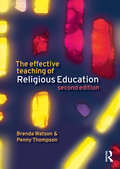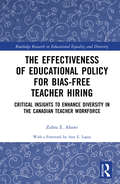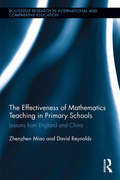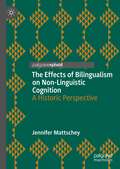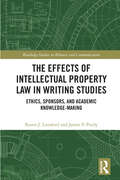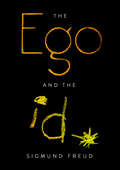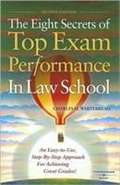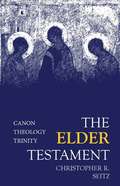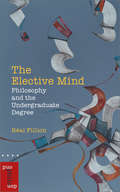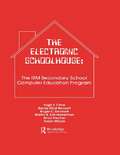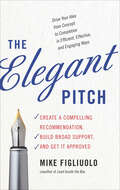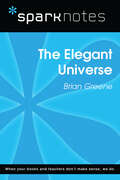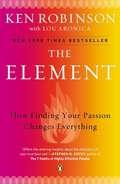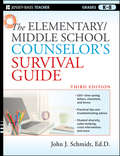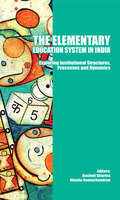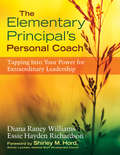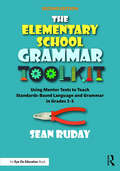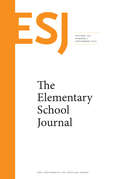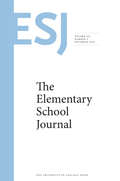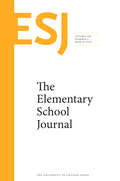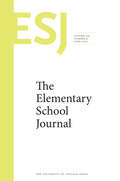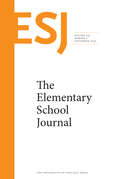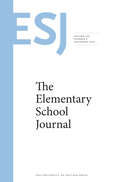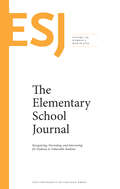- Table View
- List View
The Effective Teaching of Religious Education
by Brenda Watson Penny ThompsonThe Effective Teaching of Religious Education provides an accessible yet intellectually rigorous resource for all those involved in the teaching of RE in schools today. Written with the needs of specialist and non-specialist teachers in mind, in both the primary and secondary sectors, it successfully integrates theory and practice, encouraging debate and reflection on a broad range of issues in what is often regarded as a complex and often controversial subject area. The second edition has been written with the collaboration of a new co-author, Penny Thompson and has been thoroughly updated, revised and extended to include: A new chapter on the place of Christianity in RE New material on the purpose of RE and on the relationship of RE to other subjects A new Appendix on tackling assessment and syllabus requirements A new companion website at www.pearsoned.co.uk/watson-thompson including an overview of the use of ICT in RE teaching, web links and practical resources for use in the classroom.
The Effectiveness of Educational Policy for Bias-Free Teacher Hiring: Critical Insights to Enhance Diversity in the Canadian Teacher Workforce (Routledge Research in Educational Equality and Diversity)
by Zuhra E. AbawiThis volume offers a critical examination of educational policy in Ontario, Canada, and critiques the success of such policies in ensuring diversity and equity of access in teacher hiring. Providing comprehensive coverage of historical marginalization in the Canadian education system, the book explains the rationale and objectives of policies enacted with the aim of ensuring "bias-free", or "colourblind" hiring. Drawing on qualitative data to illustrate how educators’ lived experiences often sit at odds with the inclusivity that such policies claim to achieve, the book presents the "Equity Hiring Toolkit" as a practical framework enabling educational administrators to recognize how unconscious biases and relative positions of power can implicate hiring decisions. This text will benefit researchers, doctoral students, and academics in the fields of teacher education, educational policy, and multicultural education more broadly. Those interested in the school leadership and management, as well as race and ethnic studies will also enjoy this volume.
The Effectiveness of Mathematics Teaching in Primary Schools: Lessons from England and China (Routledge Research in International and Comparative Education)
by David Reynolds Zhenzhen MiaoThe Effectiveness of Mathematics Teaching in Primary Schools: Lessons from England and China provides a unique insight into the mathematics classrooms of these two countries and arrives at a time when the world is eager to know how Chinese learners consistently excel at learning mathematics and other core subjects. Showcasing the kinds of teaching methods that work within and across countries, this book presents a rich collection of views, including those from teachers, their native colleagues, their foreign colleagues and the researcher, regarding the quality of mathematics teaching today. Interweaving scientific results about teaching and learning evaluations with multiple perspectives of various roles in and out of the classroom, Miao and Reynolds offer insights into how and why different approaches of teaching have led to different learning outcomes in mathematics internationally. Building on rigid and robust analyses of the most up-to-date data in England and China, the book indicates that it is through changing teaching rather than changing teachers that mathematics learning can be improved, because it is what teachers do in the classroom that really makes a big difference. Containing four decades of wisdom from the field of teaching effectiveness research, this book is essential reading for all who want to improve the quality of mathematics teaching worldwide. This book is particularly relevant for educational researchers, postgraduate students and teachers, as well as school leaders, policymakers and parents.
The Effects of Bilingualism on Non-Linguistic Cognition: A Historic Perspective
by Jennifer MattscheyThis book examines a century of research on the relationship between bilingualism and intelligence and relates it to more recent research on bilingualism and executive functioning. In doing so, it highlights how bilingualism research has been understood and used by wider society and its impact on current debates in cognitive science as well as language policy and education. The book probes the correlation between the fact that while early intelligence research suggested a negative effect of bilingualism on intelligence, the so-called “Bilingual Problem”, later research implied a positive effect, “the Bilingual Advantage.” It questions whether the negative consequences that arose from the Bilingual Problem are influencing researchers’ reluctance to let go of the Bilingual Advantage. Findings on both the bilingual ‘advantage’ and ‘disadvantage’ are shown to have suffered from similar methodological problems, with research into the former finding itself at the centre of the ongoing replication crisis in psychology. This book provides fresh insights that will be of particular interest to students and scholars of cognitive psychology, psycholinguistics, bilingualism, applied linguistics, education and the history of science.
The Effects of Intellectual Property Law in Writing Studies: Ethics, Sponsors, and Academic Knowledge-Making (Routledge Studies in Rhetoric and Communication)
by Karen J. Lunsford James P. PurdyThis book documents the intellectual property experiences of writing studies scholars and challenges naturalized ways of responding to intellectual property concerns. Analyzing results of a nationwide survey and semi-structured interviews to examine ways decisions about intellectual property (IP) during academic knowledge-making are mediated by histories of enculturation, ethical lenses, and IP sponsors, the book: Identifies and illustrates a range of ethical stances that academics might adopt in regard to IP and the range of human, institutional, and technological sponsors that can mediate IP decisions; Provides evidence that IP affects all of the processes of academic knowledge-making, not just the final product; Offers heuristic questions that academics can and should ask throughout their teaching, research, and editing to make proactive IP decisions. The book is an essential read for academics working in writing studies and the humanities as well as those interested in IP. This text could also be used in graduate student training in writing studies and related disciplines.
The Ego and the Id (Complete Psychological Works Of Sigmund Freud Ser. #0)
by Sigmund FreudIn this seminal work of personality psychology, Austrian psychiatrist Sigmund Freud explains the dynamic of the human psyche with respect to the roles and conflicts produced by the id (the hidden source of human passion), ego (formed to negotiate the id's interactions with reality), and super-ego (the cricitcal, moralistic part of the mind); the latter two which remain in constant conflict with the id's demands. Freud further explores the concepts of the life force and the death force, and the anxieties driven by fear, morality, and guilt. This groundbreaking volume constitutes one of the Viennese physician's most insightful works on the topic. Penguin Random House Canada is proud to bring you classic works of literature and nonfiction in e-book form, with the highest quality production values. Find more today and rediscover books you never knew you loved.
The Eight Secrets of Top Exam Performance in Law School: An Easy-to-use, Step-by-step Approach for Achieving Great Grades
by Charles H. WhitebreadIn this work, nationally-recognized exam expert Professor Charles Whitebread will teach you the eight secrets that will add points to every exam answer you write. You will learn the three keys to handling any essay exam, how to use time to your advantage, issue-spotting, how to organize your answer, and the hidden traps of the "IRAC" method. Once you have mastered these skills, you can put your knowledge to the test with sample exam questions, and check your answers against those provided. There is also a special section on how to do well on other exams, like open book, multiple choice, or policy exams.
The Elder Testament: Canon, Theology, Trinity
by Christopher R. SeitzPart One reflects on the Old Testament as literature inquiring about its implied reader. Seitz introduces the phrase "Elder Testament" to establish a wider conceptual lens for what is commonly called the "Old Testament" or the "Hebrew Bible," so that the canon might be read to its fullest capacity. Part Two provides an overview of the canon proper, from Torah to Prophets to Writings. Seitz here employs modern criticism to highlight the theological character of the Bible in its peculiar canonical shape.
The Elective Mind: Philosophy and the Undergraduate Degree (Philosophica)
by Réal FillionThis book discusses the relevance of philosophy courses within the undergraduate curriculum as integral to the self-formation that is at the heart of a liberal education. The objective is to provide a historically layered view of what it can still mean to study for its own sake. The elective university classroom is important because the course of study is chosen out of personal interest and enthusiasm, as opposed to being primarily governed by predetermined disciplinary objectives. It engages the student’s mind directly and freely, and counters the overly specialized minds favoured by the contemporary university as well as the commodification of its degrees. The discussion builds on the distinction put forward by Raymond Williams between a dominant culture (in this case, university study as contributing to research and/or marketable degrees) and alternative and/or oppositional cultures that have both residual and emergent dimensions. The elective stream of university study is treated as alternative and oppositional to the dominant culture. The elective university classroom is examined as a combination of a classroom, students, texts, and professors. Each element is explored in terms of its alternative/residual significance as illustrated through the history of philosophy: the classroom and students through the life and death of Socrates; texts through the origins of the university in medieval scholasticism; the professor in the Humboldtian reform of the university at the beginning of the nineteenth century in Berlin. Published in English.
The Electronic Schoolhouse: The Ibm Secondary School Computer Education Program
by Hugh F. Cline, Randy Elliot Bennett, Roger C. Kershaw, Martin B. Schneiderman, Brian Stecher and Susan WilsonPublished in the year 1985, The Electronic Schoolhouse is a valuable contribution to the field of Education.
The Elegant Essay (Third Edition)
by Lesha MyersThis student book vividly portrays the art of writing elegant essay. The Appendix includes Teaching Models, Grading Sheets, and IEW Essay Model & Style Techniques.
The Elegant Pitch: Create a Compelling Recommendation, Build Broad Support, and Get it Approved
by Mike Figliuolo“The cure for death by PowerPoint and analysis paralysis . . . build support for your idea before you do a single calculation in a spreadsheet.” —Eric Grossat, Vice President, Global Marketing HCV, AbbVie“We’re sorry but your recommendation wasn’t approved.”We’ve all heard those words; it’s a sentence that swallows your hopes and crushes your confidence.Getting ideas or projects approved and securing the resources needed to implement them is one of the greatest challenges business leaders face. With multiple stakeholders, constrained budgets, and competing agendas, it’s difficult to cut through the clutter and garner the required support.The Elegant Pitch provides a simple, proven process to go from idea to approval more quickly and effectively than ever before. This is the same method used by elite strategy consulting firms such as McKinsey & Co. and Bain Consulting. But you don’t have to be a high-priced consultant to master a process that promises:Clearer and more compelling recommendations and ideasShorter and crisper communicationsGreater efficiencyShorter and fewer meetingsMore efficient decision-making processesA higher likelihood of getting your recommendations approvedDo less work, hold fewer and shorter meetings, and get ideas approved on the first pass? Sign me up!By using the methods in The Elegant Pitch, you can get to “yes” more quickly and drive the results that set you apart from the crowd.“If you need to frame up situations, challenges, and decision paths or you’re looking for support, budget, and headcount for your ideas, you’ll want to read this book twice.” —Suzie Reider, Managing Director, Brand Solutions, YouTube/Google
The Elegant Universe (SparkNotes Literature Guide Series)
by SparkNotesThe Elegant Universe (SparkNotes Literature Guide) by Brian Greene Making the reading experience fun! Created by Harvard students for students everywhere, SparkNotes is a new breed of study guide: smarter, better, faster.Geared to what today's students need to know, SparkNotes provides:chapter-by-chapter analysis explanations of key themes, motifs, and symbols a review quiz and essay topics Lively and accessible, these guides are perfect for late-night studying and writing papers.
The Element: How Finding Your Passion Changes Everything
by Lou Aronica Ken RobinsonA breakthrough book about talent, passion, and achievement from one of the world's leading thinkers on creativity and self-fulfillment. The Element is the point at which natural talent meets personal passion. When people arrive at the Element, they feel most themselves and most inspired and achieve at their highest levels. With a wry sense of humor, Ken Robinson looks at the conditions that enable us to find ourselves in the Element and those that stifle that possibility. Drawing on the stories of a wide range of people, including Paul McCartney, Matt Groening, Richard Branson, Arianna Huffington, and Bart Conner, he shows that age and occupation are no barrier and that this is the essential strategy for transforming education, business, and communities in the twenty-first century.
The Elementary / Middle School Counselor's Survival Guide
by John J. Schmidt Ed.D.An expanded edition filled with ideas, strategies, and tools for school counselorsThis Survival Guide helps counselors plan and implement an effective counseling program tailored to the needs of all students. Step by step, the book walks readers through every aspect of the school counselor job, including: designing a comprehensive counseling program, communicating with students and fellow staff, facilitating groups, promoting positive school discipline, integrating a guidance curriculum, intervening in times of crisis, and taking personal and professional care of oneself. Discusses how to reach out to diverse student and parent populations Shows how to integrate the American School Counselor Association's National Model for designing, delivering, and evaluating a school's counseling programReveals how new technology can improve services to students and parents Other titles by Wiggin: I.O.U.S.A., Demise of the Dollar, and Financial Reckoning DayThis comprehensive resource also includes a wealth of reproducible worksheets, letters, checklists, and forms designed to save time and effort for busy school counselors.
The Elementary Education System in India: Exploring Institutional Structures, Processes and Dynamics
by Rashmi Sharma Vimala RamachandranThis book focuses on the failure of elementary education since Independence, which is usually seen as the result of simplified phrases like 'lack of political will', 'because of poverty', etc. This book looks at the system as a whole: infrastructure, quality of teaching, privatisation, nutritional incentives, curriculum. It contains samples from two states namely Rajasthan and Andhra Pradesh.
The Elementary Principal’s Personal Coach: Tapping Into Your Power for Extraordinary Leadership
by Diana R. Williams Essie H. RichardsonPacked with scenarios, coaching questions, journaling sections, and professional development opportunities, this resource supports elementary principals as they handle the day-to-day challenges of school leadership.
The Elementary School Grammar Toolkit: Using Mentor Texts to Teach Standards-Based Language and Grammar in Grades 3–5
by Sean RudayTeaching grammar can be overwhelming and is often an overlooked part of effective instruction. The Elementary School Grammar Toolkit to the rescue! Now in its second edition, this comprehensive guide makes grammar instruction fun and meaningful. You will learn how to… • Teach grammar in a practical way to help students grow as readers and writers by presenting each grammar rule as a useful writing tool. • Use mentor texts—excerpts from great literature—to help students understand grammar in action. • Promote metacognition along the way so that students become responsible for their own learning. • Implement innovative instructional strategies and tools aligned with Common Core and other state standards. Throughout the book, you'll find step-by-step recommendations for teaching each of the grammar tools to help students meet the Common Core State Standards and other state language standards for grades three to five, plus classroom snapshots that show you the tools in action, handy templates that you can use in the classroom, and new tips for extra support at the end of every chapter. New! The second edition features revised classroom snapshots and exemplars to showcase successful practices, new visuals, more free charts and activities, and new "Bonus Tips for Support" in each chapter, with extra practices and strategies to use with students who need extra support. The expanded, free annotated bibliography is updated to include contemporary, high-quality children’s and young adult literature and gives examples of key grammatical concepts found in each work. These resources are available as supplemental downloads on our website.
The Elementary School Journal, volume 122 number 1 (September 2021)
by The Elementary School JournalThis is volume 122 issue 1 of The Elementary School Journal. The Elementary School Journal (ESJ) has served researchers, teacher educators, and practitioners in the elementary and middle school education for more than one hundred years. ESJ publishes peer-reviewed articles that pertain to both education theory and research and their implications for teaching practice. In addition, ESJ presents articles that relate the latest research in child development, cognitive psychology, and sociology to school learning and teaching.
The Elementary School Journal, volume 122 number 2 (December 2021)
by The Elementary School JournalThis is volume 122 issue 2 of The Elementary School Journal. The Elementary School Journal (ESJ) has served researchers, teacher educators, and practitioners in the elementary and middle school education for more than one hundred years. ESJ publishes peer-reviewed articles that pertain to both education theory and research and their implications for teaching practice. In addition, ESJ presents articles that relate the latest research in child development, cognitive psychology, and sociology to school learning and teaching.
The Elementary School Journal, volume 122 number 3 (March 2022)
by The Elementary School JournalThis is volume 122 issue 3 of The Elementary School Journal. The Elementary School Journal (ESJ) has served researchers, teacher educators, and practitioners in the elementary and middle school education for more than one hundred years. ESJ publishes peer-reviewed articles that pertain to both education theory and research and their implications for teaching practice. In addition, ESJ presents articles that relate the latest research in child development, cognitive psychology, and sociology to school learning and teaching.
The Elementary School Journal, volume 122 number 4 (June 2022)
by The Elementary School JournalThis is volume 122 issue 4 of The Elementary School Journal. The Elementary School Journal (ESJ) has served researchers, teacher educators, and practitioners in the elementary and middle school education for more than one hundred years. ESJ publishes peer-reviewed articles that pertain to both education theory and research and their implications for teaching practice. In addition, ESJ presents articles that relate the latest research in child development, cognitive psychology, and sociology to school learning and teaching.
The Elementary School Journal, volume 123 number 1 (September 2022)
by The Elementary School JournalThis is volume 123 issue 1 of The Elementary School Journal. The Elementary School Journal (ESJ) has served researchers, teacher educators, and practitioners in the elementary and middle school education for more than one hundred years. ESJ publishes peer-reviewed articles that pertain to both education theory and research and their implications for teaching practice. In addition, ESJ presents articles that relate the latest research in child development, cognitive psychology, and sociology to school learning and teaching.
The Elementary School Journal, volume 123 number 2 (December 2022)
by The Elementary School JournalThis is volume 123 issue 2 of The Elementary School Journal. The Elementary School Journal (ESJ) has served researchers, teacher educators, and practitioners in the elementary and middle school education for more than one hundred years. ESJ publishes peer-reviewed articles that pertain to both education theory and research and their implications for teaching practice. In addition, ESJ presents articles that relate the latest research in child development, cognitive psychology, and sociology to school learning and teaching.
The Elementary School Journal, volume 123 number 3 (March 2023)
by The Elementary School JournalThis is volume 123 issue 3 of The Elementary School Journal. The Elementary School Journal (ESJ) has served researchers, teacher educators, and practitioners in the elementary and middle school education for more than one hundred years. ESJ publishes peer-reviewed articles that pertain to both education theory and research and their implications for teaching practice. In addition, ESJ presents articles that relate the latest research in child development, cognitive psychology, and sociology to school learning and teaching.
